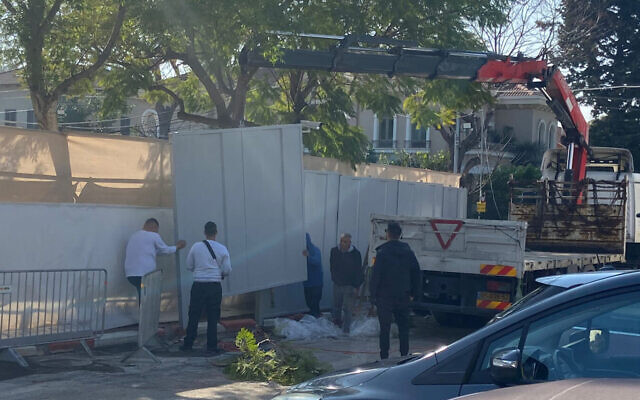Naftali Bennett’s neighbours finally get their driveways back
A silver lining of Israel’s political turmoil: a simpler life for locals in the former PM's Tel Aviv suburb of Ra’anana.
Perhaps the most immediate beneficiaries of Israeli prime minister Naftali Bennett’s decision to dissolve his government are his longtime neighbours in the Tel Aviv suburb of Ra’anana.
For almost a year they have endured large and “deafening” demonstrations by Bennett’s critics. Many were supporters of Benjamin Netanyahu, Bennett’s predecessor, who are known as “Bibists” and who used powerful megaphones, sirens and drums to express their anger at Bennett taking their beloved leader’s place.
“In the beginning, they came with large loudspeakers, and they made noise from all directions,” said a neighbour on the street who asked not to be named for fear of reprisals. “I think they were Bibists, maybe they were paid, I don’t know. They were insufferable. They said terrible things about Bennett’s children.”
Others followed: fellow right-wingers who were angry with Bennett’s willingness to provide electricity to Arab villages that had none, small business owners who suffered economically from the COVID-19 pandemic, anti-vaxxers and protestors who opposed coronavirus restrictions. Some demonstrators came to support Bennett by facing off his detractors.

All of the noise ended abruptly last week after Bennett announced that he could not maintain his government coalition and would step aside while the country moves toward new elections.
But his neighbourhood in Ra’anana has been reshaped by his tenure as Israel’s leader, the shortest in the country’s 75-year history. So has the role of the house he didn’t move into in Jerusalem.
That house is the Official Residence of the Prime Minister, on the corner of Balfour and Smolenskin streets. Sitting empty since Netanyahu vacated it nearly one year ago, it has become a symbol of the political turmoil that has engulfed the country over the past three years.
Netanyahu occupied the residence since 2009 and didn’t want to leave, sparking years of raucous public demonstrations until movers came quietly during the night in July 2021 and packed up the Netanyahus’ belongings, leaving the residence vacant ever since.
Bennett declined to transfer his young family there after taking office, ostensibly because the 90-year-old building desperately needed renovations. He has never slept in the official residence, adding to the sense that no one has truly replaced Netanyahu, even as an ideologically eclectic coalition managed to unseat him.
Now a third prime minister, Yair Lapid, wants to move in next week, but can’t. After working with Bennett to form the tenuous government coalition, Lapid will lead the country for the few months left until Israelis go to the polls again. But because renovations are now underway at the official residence, he too will likely end his term without sleeping one night there.
Lapid will instead move into an apartment within the residence’s security perimeter that previously has been occupied by guards, placing him at least adjacent to the seat of power and likely shielding his family’s Tel Aviv neighbors from the kinds of disruptions that plagued Bennett’s.
In part because of the protests and Bennett’s neighbors’ appeal to Israel’s top court demanding that police place limits on the demonstrators, Israeli security services turned Bennett’s residence into a fortress. Some homes were trapped inside a security zone, meaning that their residents needed permission to enter and exit.
Chipman Street is covered with cameras that sit, like birds, on metal rods from lamp poles and point in every direction, invading residents’ privacy and driving them crazy with their constant hum.
That hum becomes a chorus nightly with the sound of generators that power enormous projectors, which, every night, light up the area surrounding Bennett’s home — as well as the bedrooms and living areas of his neighbours.
For many residents, walls block the view where there was once greenery. Their cars are searched, and their IDs are checked.
“I’m sick of the questions. ‘Give me your name, show me your ID.’ I don’t want to show you anything,” said one neighbour, who has lived in the neighbourhood for over 30 years and who asked not to be named. “I take my dog out for a walk. I need to ask permission to pass in two directions. It’s like living in a jail now.”
Ohad Shalom, a 37-year-old accountant and married father of six, also lives within the “sterilised zone”: in-between the solid steel barrier that blocks off one side of Chipman Street adjacent to Bennett’s home and between the waist-high hydraulic steel cylinders that must lower into the ground each time someone wants to enter or exit with a vehicle.
“I look out the window and see steel walls surrounding me,” said Shalom, the neighbourhood committee chairman who is leading the fight at the High Court on behalf of neighbourhood residents. In addition to asking the court to limit demonstrations around the house, Bennett’s have also asked that barriers and security fences built on their property be removed.
“There’s a generator here that pollutes the air. I, my wife and children can only enter the house from one direction. They built a 3-meter-high wall,” Shalom said. “A neighbour asked that they build the wall 1 meter into the Bennett family’s garden, but Gilat Bennett [Naftali Bennett’s wife] did not agree. We have been suffering for 12 months and they don’t even notice us.”
The official reason for Bennett not moving with his family to Balfour was that the residence needed to be renovated by the Shin Bet security services. Indeed, Sara Netanyahu, the former premier’s wife, had complained of the dilapidated state of the residence for years. But a strike by Defence Ministry employees delayed the start of the work. Bennett admitted in January that he had no intention of moving his family but told the Yedioth Ahronoth newspaper, “When Balfour renovations are finished, I’ll move there two to three days a week… My family will stay in Ra’anana.”
Recently, an Israeli journalist sparked an uproar after reporting that security and construction cost taxpayers some $14 million. Bennett said defensively, fearing that he would be accused of one of the crimes that his predecessor was accused of, that the report was not accurate and that the money was almost all spent on security, not for renovating his house.
Reflecting on his short-lived term as prime minister, Naftali Bennett seemed to have second thoughts about his decision to remain in Ra’anana and give up on Balfour Street. In an interview with Israel’s Channel 13 News, the outgoing prime minister said that had he known that security needs would turn his home into a fortress and cause so much trouble to his neighbours, he would have “taken a sleeping bag and slept at Balfour.”
The building that has laid vacant for an entire year is one of if not the strongest visual symbol in Israel of the power of its occupier. And with recent polls showing that the Likud party, still led by Netanyahu, stands a reasonable chance of heading the next coalition, it may be more important than ever for someone else to show the Israeli public that someone besides Netanyahu can sit, eat and sleep in that coveted seat of power.
But that person won’t be Lapid, the leader of the second-largest party and on track to be the interim prime minister.
Unlike Bennett, Lapid has made clear he wishes to move into Balfour immediately and stay there most nights, while his family remains in Tel Aviv. But with renovations only in their early stages, the official residence is in no shape to welcome a new prime minister, and Lapid is now resigned to move into a rental apartment in Jerusalem.
Back in Ra’anana, one of Bennett’s neighbours said she wouldn’t exchange the difficulties she experienced over the last year at home for the return of Netanyahu to the official residence on Balfour Street.
“Absolutely not!” she said. “I’m willing to continue to suffer.”

Thank you for helping to make Jewish News the leading source of news and opinion for the UK Jewish community. Today we're asking for your invaluable help to continue putting our community first in everything we do.
For as little as £5 a month you can help sustain the vital work we do in celebrating and standing up for Jewish life in Britain.
Jewish News holds our community together and keeps us connected. Like a synagogue, it’s where people turn to feel part of something bigger. It also proudly shows the rest of Britain the vibrancy and rich culture of modern Jewish life.
You can make a quick and easy one-off or monthly contribution of £5, £10, £20 or any other sum you’re comfortable with.
100% of your donation will help us continue celebrating our community, in all its dynamic diversity...
Engaging
Being a community platform means so much more than producing a newspaper and website. One of our proudest roles is media partnering with our invaluable charities to amplify the outstanding work they do to help us all.
Celebrating
There’s no shortage of oys in the world but Jewish News takes every opportunity to celebrate the joys too, through projects like Night of Heroes, 40 Under 40 and other compelling countdowns that make the community kvell with pride.
Pioneering
In the first collaboration between media outlets from different faiths, Jewish News worked with British Muslim TV and Church Times to produce a list of young activists leading the way on interfaith understanding.
Campaigning
Royal Mail issued a stamp honouring Holocaust hero Sir Nicholas Winton after a Jewish News campaign attracted more than 100,000 backers. Jewish Newsalso produces special editions of the paper highlighting pressing issues including mental health and Holocaust remembrance.
Easy access
In an age when news is readily accessible, Jewish News provides high-quality content free online and offline, removing any financial barriers to connecting people.
Voice of our community to wider society
The Jewish News team regularly appears on TV, radio and on the pages of the national press to comment on stories about the Jewish community. Easy access to the paper on the streets of London also means Jewish News provides an invaluable window into the community for the country at large.
We hope you agree all this is worth preserving.






















